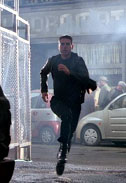
Movie Guru Rating:

Comment
on this review
| |

Minority Report is a fine Spielbergian action movie for the summer, not the ages.
by Coury Turczyn
Here's the angle: Steven Spielberg has grown up. No longer the saccharine sentimentalist with the child-like sense of wonder, he is now a savvy adult daring to expose his newfound cynicism. He has a much darker view of America now, far from the sunny suburban streets of Close Encounters of the Third Kind or E.T., and he isn't afraid to share it with us.
To a certain extent, this studio-spun and critic-regurgitated hype is true: Both last summer's A.I. and now Minority Report do reveal a growing maturity as a storyteller, and both movies are really good. Whereas A.I. was a delicate science fiction parable, Minority Report is a sci-fi slam-bang actioner starring our biggest slam-bang action hero, Tom Cruise. You can guess which movie has gotten the better reviews: "...a film that can get you high on the sheer magic and exhilaration of making movies" (Chicago Tribune), "a masterful work...that challenges the mind and engages the spirit" (Roger Ebert), "Breathtaking and disturbing" (salon.com), "...feels almost classic" (San Francisco Chronicle).
Yet, for all its kudos and its dark vision of the future, Minority Report is the less affecting movie. Spielberg coolly and efficiently accomplishes what he set out to make: a solid piece of genre entertainment. Certainly, there's nothing wrong with that—it's always enjoyable to watch Tom Cruise race around and occasionally blast someone with a sonic shotgun. But whether Spielberg is really "saying" new things about the state of the world is questionable. Most of his brave prognostications about society have been examined in previous movies, but he's applied such a bright polish to them that they seem new again. In the end, though, Minority Report is a bit too bloodless, too cold, and too familiar to really "haunt your nightmares for years to come" (New York Post).
Based on a 1956 short story by Philip K. Dick, Minority Report envisions a future in which genetically engineered pre-cognitives can sense murders that haven't occurred yet. Seeing an opportunity to cut its zooming murder rate, Washington D.C. creates an entire "pre-crime" police unit around a trio of pale, hairless "pre-cogs" who soak in a hot tub all day with their heads strapped to video recorders. When they have visions of murders to come, these images are displayed on computer screens and it's up to John Anderton (Cruise) and his squad to figure out who the people are, where they're located, and then to stop the murder before it happens. The moral dilemma over whether you should convict someone for a crime they haven't actually committed comes to an interesting head when the pre-cogs see Anderton himself commit a future murder. Rather than turn himself in and be condemned to suspended animation, Anderton goes on the run and attempts to find out the truth.
This plotting does introduce two niggling questions: First, since Anderton is a cop, why doesn't anyone—including Anderton—consider that his future act of murder might actually be in the line of duty as self-defense? Secondly, it's established in the opening scene that pre-cogs can't foresee sudden crimes of passion until minutes before they occur. Anderton's murder of somebody he doesn't even know must surely not be pre-meditated, yet the pre-cogs see the event a full 72 hours before it happens. Why?
Spielberg likes a clean, well-designed future, and Minority Report's vision for the year 2054 is no exception. The eye candy is luscious: Sleek magnetic cars careen automatically over vast expanses of highways that smoothly ramp up and over skyscrapers. Bauhausian apartments come decorated straight from the Ikea catalog. Pristine shopping malls spray video ads onto walls that beckon you by name. Even the future-D.C.'s fringe areas of run-down housing units seem exactingly art-directed.
The city's infrastructure is all tied together by a system of retina scanners that record your every move, from where you shop to which subway train you've boarded. This bit of future shock, combined with the portrayal of an invasive justice system, has inspired much of the acclaim for Spielberg's "dark vision." Yet many of Minority Report's scary devices and bleak characters seem borrowed. Certainly, the future noir setting and lonely, bitter detective were seen in Ridley Scott's Blade Runner 20 years ago, as was the concept of pervasive video advertising—remember the ad drones constantly floating overhead? Likewise, the idea of a police state allowed to monitor your every move and investigate thought crimes is straight out of the wellspring of Big Brother fear, 1984.
Minority Report's one big failing, however, is its main character: a familiar noir detective without much of a personality to call his own. We know Anderton is lonely and tortured because he watches bad videos of his long-lost son and does inhalants to get high. Cruise does his best to look upset at times, but otherwise he appears like his usual flawless and heroic self. This is not someone you can particularly feel for or be surprised by. The result is a good-looking, entertaining summer action movie centered on an attractive yet boring guy we all know will succeed. Just like a lot of other movies. So what's the fuss?

June 27, 2002 * Vol. 12, No. 26
© 2000 Metro Pulse
|